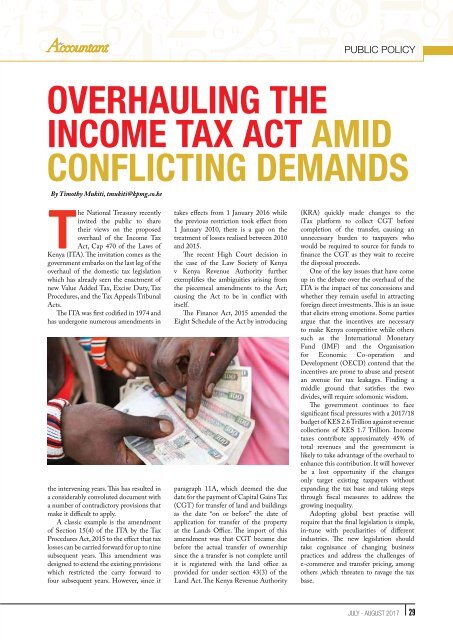The-Accountant-Jul-Aug-2017
Create successful ePaper yourself
Turn your PDF publications into a flip-book with our unique Google optimized e-Paper software.
Public Policy<br />
OVERHAULING THE<br />
INCOME TAX ACT AMID<br />
CONFLICTING DEMANDS<br />
By Timothy Mukiti, tmukiti@kpmg.co.ke<br />
<strong>The</strong> National Treasury recently<br />
invited the public to share<br />
their views on the proposed<br />
overhaul of the Income Tax<br />
Act, Cap 470 of the Laws of<br />
Kenya (ITA). <strong>The</strong> invitation comes as the<br />
government embarks on the last leg of the<br />
overhaul of the domestic tax legislation<br />
which has already seen the enactment of<br />
new Value Added Tax, Excise Duty, Tax<br />
Procedures, and the Tax Appeals Tribunal<br />
Acts.<br />
<strong>The</strong> ITA was first codified in 1974 and<br />
has undergone numerous amendments in<br />
the intervening years. This has resulted in<br />
a considerably convoluted document with<br />
a number of contradictory provisions that<br />
make it difficult to apply.<br />
A classic example is the amendment<br />
of Section 15(4) of the ITA by the Tax<br />
Procedures Act, 2015 to the effect that tax<br />
losses can be carried forward for up to nine<br />
subsequent years. This amendment was<br />
designed to extend the existing provisions<br />
which restricted the carry forward to<br />
four subsequent years. However, since it<br />
takes effects from 1 January 2016 while<br />
the previous restriction took effect from<br />
1 January 2010, there is a gap on the<br />
treatment of losses realised between 2010<br />
and 2015.<br />
<strong>The</strong> recent High Court decision in<br />
the case of the Law Society of Kenya<br />
v Kenya Revenue Authority further<br />
exemplifies the ambiguities arising from<br />
the piecemeal amendments to the Act;<br />
causing the Act to be in conflict with<br />
itself.<br />
<strong>The</strong> Finance Act, 2015 amended the<br />
Eight Schedule of the Act by introducing<br />
paragraph 11A, which deemed the due<br />
date for the payment of Capital Gains Tax<br />
(CGT) for transfer of land and buildings<br />
as the date “on or before” the date of<br />
application for transfer of the property<br />
at the Lands Office. <strong>The</strong> import of this<br />
amendment was that CGT became due<br />
before the actual transfer of ownership<br />
since the a transfer is not complete until<br />
it is registered with the land office as<br />
provided for under section 43(3) of the<br />
Land Act. <strong>The</strong> Kenya Revenue Authority<br />
(KRA) quickly made changes to the<br />
iTax platform to collect CGT before<br />
completion of the transfer, causing an<br />
unnecessary burden to taxpayers who<br />
would be required to source for funds to<br />
finance the CGT as they wait to receive<br />
the disposal proceeds.<br />
One of the key issues that have come<br />
up in the debate over the overhaul of the<br />
ITA is the impact of tax concessions and<br />
whether they remain useful in attracting<br />
foreign direct investments. This is an issue<br />
that elicits strong emotions. Some parties<br />
argue that the incentives are necessary<br />
to make Kenya competitive while others<br />
such as the International Monetary<br />
Fund (IMF) and the Organisation<br />
for Economic Co-operation and<br />
Development (OECD) contend that the<br />
incentives are prone to abuse and present<br />
an avenue for tax leakages. Finding a<br />
middle ground that satisfies the two<br />
divides, will require solomonic wisdom.<br />
<strong>The</strong> government continues to face<br />
significant fiscal pressures with a <strong>2017</strong>/18<br />
budget of KES 2.6 Trillion against revenue<br />
collections of KES 1.7 Trillion. Income<br />
taxes contribute approximately 45% of<br />
total revenues and the government is<br />
likely to take advantage of the overhaul to<br />
enhance this contribution. It will however<br />
be a lost opportunity if the changes<br />
only target existing taxpayers without<br />
expanding the tax base and taking steps<br />
through fiscal measures to address the<br />
growing inequality.<br />
Adopting global best practise will<br />
require that the final legislation is simple,<br />
in-tune with peculiarities of different<br />
industries. <strong>The</strong> new legislation should<br />
take cognisance of changing business<br />
practices and address the challenges of<br />
e-commerce and transfer pricing, among<br />
others ,which threaten to ravage the tax<br />
base.<br />
JULY - AUGUST <strong>2017</strong> 29

















